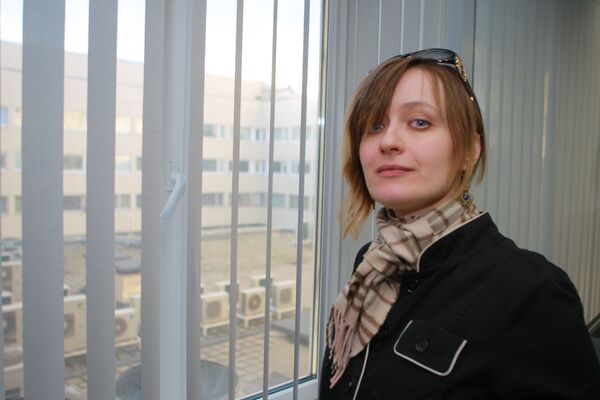The whole of world history is a history of brutality - but are Russians too casual about violence and death?
I was reminded of this question this week when two things happened: an plane crash took the lives of 31 people in Tyumen, while reports surfaced that children were being sold a notebook with a picture of Joseph Stalin on it, as part of a series on great Russians.
Aviation disasters are horrifyingly common on Russian soil, while Stalin keeps popping up in random places - I still recall that time when his face grinned at us from a bus in Tomsk.
Over at Russia Profile, Dan Peleshcuk talked to Vladimir Pribylovsky, the head of the Panorama think tank, about how come the kind of needless death that accompanies plane crashes in particular doesn’t cause more outrage in Russia, and why the authorities aren’t held accountable at times like these.
Pribylovsky believes that Russians have built up a tolerance for bad news - and that the kind of random, meaningless loss of life that occurs every time another plane goes down has made the majority of the Russian population immune to tragedy. “Look at Peter the Great: he killed more people in his time than Stalin did, relative to the population at the time,” Pribylovsky told Peleschuk. “Nevertheless, he’s regarded as the greatest and most successful figure in Russian history – and it’s not only the government that believes this, but society also.”
The problem of Russian history is often the problem of relativity. Peter the Great doesn’t have the bloodthirsty image of Ivan the Terrible, whose Russian Wikipedia page reads like the latest script for some Eli Roth torture porn extravaganza - so Peter’s all right! And as for Stalin - well, at least he wasn’t Hitler, i.e., he didn’t invade other countries and kill the people there - so we can give him a break, sort of.
“Stalin had incompetent people shot,” an elderly person told me recently. “If it was up to Stalin, the people who were responsible for planes falling out of the sky would have been shot.”
I didn’t start a debate with this pensioner - she has blood pressure problems, there was no need to exacerbate them. But I want to be realistic: executions would have probably been reserved for those who are not particularly close to power and unable to absolve themselves of responsibility. When you have a top-down system of governance that’s tyrannical in nature, you don’t instill a sense of justice or accountability. What you instill is a penchant for being very good at deflecting blame in order to survive. Think of it as a special kind of natural selection: it’s why today’s bureaucrats are excellent at not assuming responsibility when something as tragic as the Tyumen crash happens.
The rest of the country, I would argue, is too philosophical for its own good.
“Stick a shovel into the ground almost anywhere and some horrible thing or other will come to light,” Margaret Atwood once wrote. This is a fundamental truth that most Russians know. They know it, and they are thoughtful about it.
A plane falls - well, planes will do that, especially in a country with a troubled aviation industry. No sense in tearing your hair out over it. That won’t help the victims. A controversial notebook hits the shelves - well, at least it’s just a notebook. Back in 1937, people had way more to worry about than some piece of paper.
This kind of thoughtfulness, so admired by foreigners and frequently bound up in that whole weird concept of “the Russian soul,” gives some people an excuse to perform merely symbolic gestures in the face of tragedy - and by that I mean both high-placed officials and folks directly responsible for making sure that a plane sitting on the runway in bad weather is properly de-iced. Why try too hard if death is ever-present?
I’m not good at making predictions, and I can’t tell you whether or not Russians will begin placing a higher premium on human life anytime soon. In the end, like many people, I derive my optimism from relativity:: at least: they place a higher premium on it in 2012 than they did in 1937. And 1725. And 1584. Just like in the Beatles song, it’s getting better all the time.
The views expressed in this article are the author's and do not necessarily represent those of RIA Novosti.
Trendwatching in Russia is an extreme sport: if you’re not dodging champagne corks at weddings, you’re busy avoiding getting trampled by spike heels on public transportation. Thankfully, due to an amazing combination of masochism and bravado, I will do it for you while you read all about it from the safety of your living room.
Natalia Antonova is the deputy editor of The Moscow News. She also works as a playwright – her work has been featured at the Lyubimovka Festival in Moscow and Gogolfest in Kiev, Ukraine. She was born in Ukraine, but spent most of her life in the United States. She graduated from Duke University, where she majored in English and Slavic Literature. Before coming to Moscow, she worked in Dubai, UAE and Amman, Jordan. Her writing has been featured in The Guardian, Foreign Policy, Russia Profile, AlterNet, et al.
Trendswatcher: What the brief life of Anya Shkaptsova can teach us
Trendswatcher: Valeria Gai Germanika. A Bitter Pill for Pensioners
Trendswatcher: The Curious Case of Philipp Kirkorov
Trendswatcher: Of lady-business and Soviet imagery
Trendswatcher: Dinosaurs Stalking Moscow Playgrounds
Trendswatcher: Putin Quoted Lermontov and the Lit Geeks Rejoiced
Trendswatcher: Whitney Houston Is Dead, Long Live Whitney Houston
Trendswatcher: The Trouble with ‘Intimate’ English
Trendswatcher: When Looking ‘Normal’ is a Matter of Life and Death
Trendswatcher: An Education. The Foreign Kind
Trendswatcher: The rich also bruise
Trendswatcher: Marriage needs magic? Don’t go for the literal kind!



